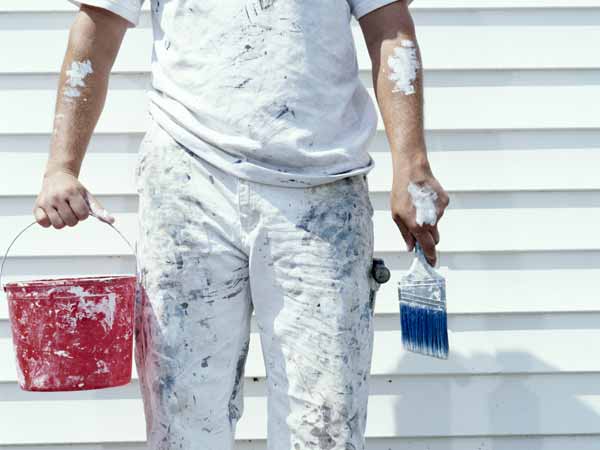
Hiring a true professional ensures that you get the most durability and satisfaction out of your paint job. You can save time and frustration by asking the right questions BEFORE hiring the contractor. Asking in-depth questions helps you identify inexperienced or unqualified painters and weed out the bogus claims being made about the proposed coating's durability. A true professional can produce the product spec sheet to review and satisfactorily answer all of the following questions.
1. Are you Licensed and Insured?
This is important because most localities only require painters to have at least a business license and a painting or
contractors license. To protect yourself from liability from an injury a worker may receive while working on your
property and to protect your home from damage inadvertently caused, the painter should have two types of insurance.
The contractor should have Workmen's Compensation, and Comprehensive Business Liability or hold a Workmen's Compensation
exemption and Comprehensive Business Liability.
2. What products will you use and why?
Painters tend to establish a relationship with a particular store or brand of paint. If the painter is reluctant to apply
Liquid Vinyl Siding, it is fair to ask why. He should have the facts to back-up why refusing to apply. If you are being steered
toward a low-cost product, find a different contractor. A professional knows that you never get more than you pay for when it
comes to paint. When it comes to permanent coatings, there are a lot om imposters. Ask to see the technical data sheet. If the
contractor is reluctant to produce one and show it to you he may have something to hide and there is a possibility that
the coating being presented is just ordinary paint. .
3. How long do you expect the new coating to last?
Tough question. Exterior latex/acrylic paint can last 5 to 7 years ONLY IF a very high quality paint is applied over a surface
that has been meticulously prepared, fully primed and nothing goes wrong. It is unreasonable to think that paint can last
any longer due to the fact that environmental agencies have forced manufacturers to remove many of the components from
paint that contributed to its protective properties and longevity. Weather and environment conditions can significantly
degrade a new coat of paint quickly whereas Liquid Vinyl Coating will last 30 years or more.
4. What prep work is involved and will pressure washing be done prior to painting?
Proper surface preparation prior to painting is the most important step. This should include thorough pressure washing to
remove all chalking, mildew and surface contaminants along with anything else that may interfere with adhesion. For any paint
to last it is imperative that all surfaces are fully primed. Dredging down 2 to 4 inches around the exterior to allow sealer
to be applied below ground level may also be necessary when coating is being applied to ground level. Window and door surrounds
should be caulked all around and large cracks should be filled with a quality sealant. Decks and areas susceptible to overspray
should be covered along with shrubs and bushes to protect your landscape and fixtures should be covered or temporarily removed
before spraying.
5. Do you Spray and/or Brush and Roll?
Both options have their pros and cons. Spraying is the faster method, is free of brush marks and can get into hard to reach areas.
It's the best process for uniform coverage and control of film thickness. Rolling and Brushing have excellent control but takes
longer and requires at least two coats for proper coverage and mil thickness. Every paint manufacturer specifies the minimum spread
rate (mil thickness) for their product. Painters often ignore these rates or thin the coating by watering it down to extend coverage
and increase their profit.
8. Does the work come with a WARRANTY and who will back it?
A professional paint contractors will typically offer a guarantee on his work that will be in writing. Very few paint
manufacturers offer a warranty on their paint, and if they do include restrictions that make it almost impossible for a
homeowner to make a warranty claim. Ask to see a written warranty and review the terms.
